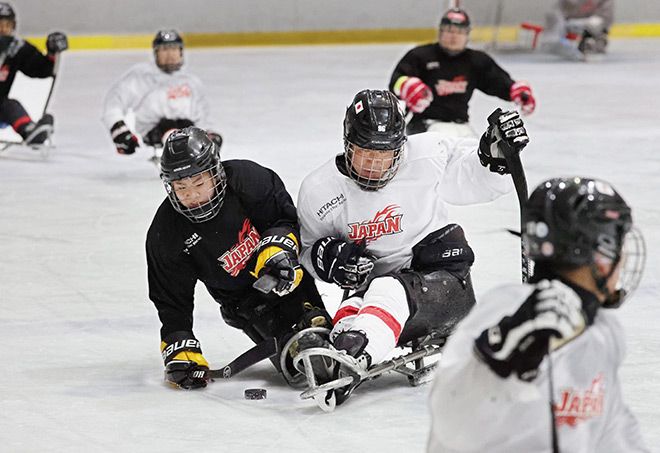Japan’s struggling national hockey team of disabled players has run into a new problem that threatens to put its Winter Paralympic dreams on ice.
The para ice hockey team failed to secure sufficient subsidies to fund its travel and other expenses for the world championships scheduled for September in Kazakhstan.
Japan must finish high in the Kazakhstan tournament to advance to the final world qualifier in November in Norway.
But if the team cannot even get to Kazakhstan, it will have no chance to play in Norway, let alone the Milano Cortina Winter Paralympics in March 2026.
The team started a crowdfunding campaign on July 1 in a last-ditch effort to raise money. The Japan Para Ice Hockey Association is also calling for extensive public assistance.
“We cannot leave the athletes with no choice but to give up their dream simply due to financial reasons,” said an association representative in charge of promoting the sport and the national team.
Called “Mirai e Tsuzuku Hyojo No Chosen o Oen!” (Support their challenging path on ice toward the future!), the crowdfunding drive set a goal of 12 million yen ($80,000).
Players and staff members each need an average of 750,000 yen for traveling, accommodation and equipment transportation expenses at the world championships.
The entire team needs an estimated 18 million yen in personal expenditures.
If the fund-raising campaign fails to reach the target, the players are expected to cover all the costs by themselves.
Team members are asking for support on social media while spreading the appeal of para ice hockey by sharing personal messages.
Only eight countries will be represented in para ice hockey at the 2026 Paralympics. Italy already has an automatic berth as host country of the Games.
In world para ice hockey rankings, Japan is placed in the B-Pool of nations placed ninth to 14th.
Japan must finish as one of the top teams in the B-Pool at the Kazakhstan world championships to join the final qualifying round in Norway.
In the final qualifier, Japan is expected to battle the lowest-ranking teams from the A-Pool for the remaining two spots in the Paralympic Games.
The Japanese team’s dire financial situation originates from its struggles on the rink.
The amount of subsidies allocated for each sport by the Japanese Paralympic Committee is determined by performances in the Games and other competitions.
Japan’s para hockey team won a silver medal at the 2010 Vancouver Winter Paralympics and qualified for four consecutive Games since Nagano in 1998.
But the team has had lackluster results recently and failed to qualify for major international tournaments.
Para ice hockey is no longer covered by the Japan Sports Agency’s program to pour resources into especially important sports in the run-up to the Milano Cortina Winter Paralympics.
The lack of funds has made it increasingly difficult for the team to arrange games with other countries.
On top of this, team players need to bear nearly all participation costs for the specialized training camp organized twice a month.
“It is no longer possible for us to gain ample experience on the international stage due to our cash shortage, which has, in turn, undermined our performance,” said Satoru Sudo, 54, a director of the Japan Para Ice Hockey Association, who is playing a central role in the crowdfunding drive. “We are now caught in a vicious spiral.”
But there are some rays of hope for para ice hockey in Japan.
New talent has emerged in recent years, and teenagers are now key players on the national team.
One of them, Itsuki Ito, 19, became the first Japanese named MVP in the B-Pool of the 2023 world championships.
Following his graduation from high school, Ito received a scholarship to study in the United States. He now aims to build a global hockey career by refining his skills with a local team.
Veteran players, including Sudo, are also going strong.
Sudo, who has competed in three straight Paralympics since the 2002 Salt Lake City Games, remains active as a national team member and a long-standing pillar for Japan in the sport.
“I feel a sense of crisis that unless we do whatever it takes, para ice hockey may disappear as a sport from Japan,” he said. “We will be appealing exhaustively to the general public, keeping in mind not only individuals who want to take up para ice hockey but also people who find the sport intriguing to watch.”
The dedicated crowdfunding site is available in Japanese at (https://readyfor.jp/projects/japan_parahockey).
Donations start from 10,000 yen. Those who provide 1 million yen will be eligible for a uniform signed by participating players and other staff members. The deadline is Aug. 31.


AloJapan.com